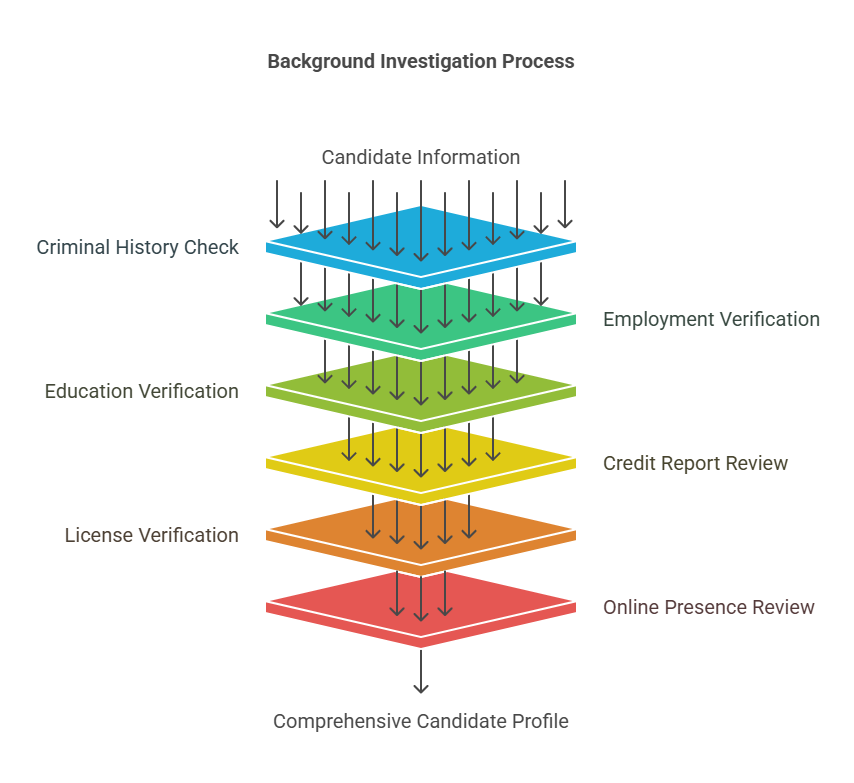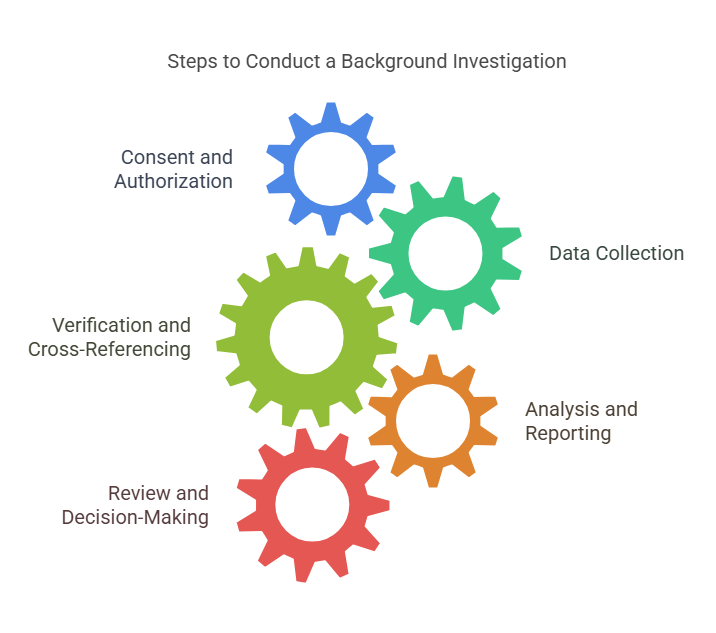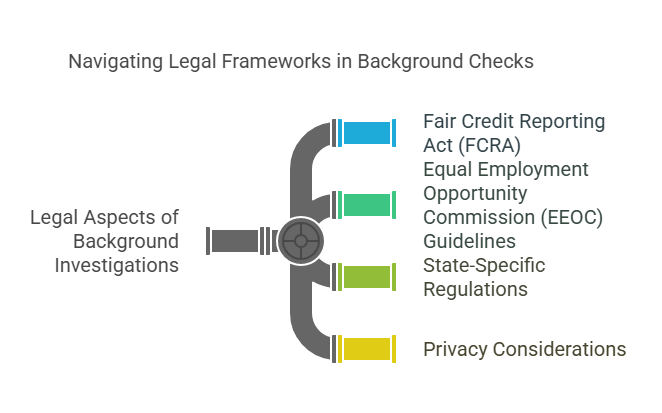Step-by-Step Guide to Background Investigation Procedures

Introduction and Overview of Background Investigations
Background investigation is an essential tool used by employers, landlords, and other organizations to gather information about individuals before making critical decisions. Whether you’re hiring an employee, renting to a tenant, or determining someone’s eligibility for a government contract, conducting a background investigation is a prudent step to ensure safety, trust, and security. In today’s society, where information is abundant, conducting a background investigation has become an essential part of the hiring and selection process across industries.
What is a Background Investigation?

A background investigation is a comprehensive check into an individual’s history to verify the information they’ve provided and to uncover any potential risks or concerns. The goal is to gather factual data about an individual’s personal, professional, and criminal history, which can be used to make informed decisions. Background investigations are typically broader and more detailed than background checks, which are often limited to criminal or employment history alone.
The investigation can involve various types of checks depending on the purpose and requirements. Here are some common components that make up a background investigation:
- Criminal History: Searching national, state, and local databases to uncover any criminal convictions, arrests, or pending charges.
- Employment History: Verifying previous employment to confirm job titles, dates of employment, and reasons for leaving.
- Education Verification: Confirming educational qualifications, degrees earned, and schools attended.
- Credit Reports: Particularly for positions requiring financial responsibility, a credit report may be checked to evaluate the individual’s financial habits and stability.
- Professional Licenses: Verifying whether the individual holds relevant licenses for their profession, such as in healthcare or legal services.
- Social Media and Online Presence: Investigating an individual’s online presence to uncover any red flags or concerns about their behavior or values.
Importance of Background Investigations
Background investigations serve several crucial purposes across different sectors, helping organizations assess the suitability of individuals for specific roles or responsibilities.
- Employment: Employers use background investigations to ensure they are hiring trustworthy, qualified, and reliable candidates. It helps mitigate the risk of hiring someone with a criminal history, false credentials, or a problematic past that could jeopardize the company’s reputation or safety.
- Housing: Landlords conduct background investigations on potential tenants to verify their rental history, financial stability, and criminal background. This helps minimize the risk of leasing to individuals who may cause problems or damage property.
- Government Contracts and Security Clearances: Organizations working with the government may need to conduct extensive background investigations to ensure that employees or contractors meet the necessary security requirements. This includes checking for criminal behavior, financial instability, or potential conflicts of interest.
- Trust and Safety: In many industries, such as healthcare, finance, and education, the background investigation ensures that individuals can be trusted with sensitive information, vulnerable populations, or access to critical systems.
Evolution of Background Investigations
Background investigations have become more commonplace and sophisticated over the years. The practice of conducting background checks dates back to the early 20th century, when employers started to verify an applicant’s history to avoid hiring individuals who could potentially be problematic. Over time, background investigations have evolved from basic manual checks to more automated, digital processes that can access vast databases of information across multiple jurisdictions.
With the increasing reliance on technology, background investigations have become faster and more thorough, enabling employers and other organizations to make better-informed decisions. Today, a background investigation can involve not only criminal records and employment verification but also a review of an individual’s social media presence, online activity, and even personal references. Furthermore, the rise of social justice movements, data privacy regulations, and advocacy for fair hiring practices has led to an increased emphasis on ensuring that these investigations are conducted fairly and ethically.
The growing complexity of background investigations reflects the broader changes in society. With more people seeking jobs, housing, and security clearances, the need for accurate and reliable background checks has become more critical. At the same time, compliance with local, state, and federal laws has made background investigations more regulated, emphasizing the importance of maintaining privacy, accuracy, and fairness in the process.
Types of Background Investigations, Process, and Our Services
Background investigations come in various forms, each tailored to meet the specific needs of the industry, role, or purpose for which they are being conducted. Whether you are an employer screening job candidates, a landlord evaluating potential tenants, or a government agency performing a security clearance check, understanding the different types of investigations and the process involved is essential to ensure a thorough and compliant evaluation.
Types of Background Investigations
- Employment Background Checks Employment background checks are one of the most common forms of background investigations. They are typically used by employers during the hiring process to verify the information provided by job candidates and to assess any potential risks to the organization. Key components of an employment background check may include:
- Criminal Record Check: Employers check national, state, and local criminal databases for any convictions or pending charges. Certain employers may have strict policies about hiring individuals with criminal histories, depending on the nature of the job.
- Employment Verification: Employers often verify past employment details, including job titles, employment dates, and reasons for leaving.
- Education Verification: Employers may verify educational qualifications, especially for roles requiring specific degrees or certifications.
- Credit Reports: For roles that involve financial responsibilities, employers may review an applicant’s credit history to assess their financial responsibility.
- Reference Checks: Verifying references provided by the candidate helps confirm their character and professional conduct.
- Tenant Background Checks Tenant background checks are conducted by landlords to assess the suitability of a potential tenant. Landlords want to ensure that tenants will respect the property and pay rent on time. Key components of a tenant background check include:
- Criminal History Check: This helps landlords identify if the tenant has any criminal records that may pose a risk to the property or the community.
- Rental History: Verifying a potential tenant’s past rental experiences, including evictions or unpaid rent, helps determine their reliability as a tenant.
- Credit Check: A tenant’s credit report can give insight into their financial stability and ability to pay rent on time.
- Employment Verification: Confirming the tenant’s income and employment status helps ensure they can afford the rent.
- Security Clearance Investigations Security clearance investigations are a type of background check conducted for individuals applying for jobs that require access to sensitive or classified information. These checks are typically more extensive than standard background checks and can include:
- Criminal and Civil History: A detailed review of the individual’s criminal background as well as any civil legal matters.
- Financial History: A deeper look into the individual’s finances, including credit reports, to ensure there are no signs of financial instability or risk of blackmail.
- Foreign Influence: Investigators may check for connections to foreign governments or entities that could present a national security threat.
- Personal Interviews: In some cases, the individual’s family, friends, or colleagues may be interviewed to assess the individual’s character and reliability.
- Financial Background Investigations Financial background investigations are often required for positions that involve financial responsibilities, such as banking, accounting, or investment roles. These investigations typically focus on the individual’s financial stability and history. They may include:
- Credit History: Checking an individual’s credit report to assess their financial behavior, including debt, payment history, and bankruptcy filings.
- Bankruptcies or Foreclosures: Reviewing any past bankruptcies or foreclosures that may indicate financial instability.
- Tax Liens or Outstanding Debts: Checking for any significant debts or unresolved financial issues.
The Process of Conducting a Background Investigation

Conducting a background investigation involves several key steps, each designed to gather accurate and relevant information about an individual. The process typically follows these steps:
- Consent and Authorization Before any background check can begin, consent must be obtained from the individual being investigated. This is typically done through a signed release form. Consent is required by law, particularly under the Fair Credit Reporting Act (FCRA), which ensures that individuals’ rights are protected during the screening process.
- Data Collection The next step involves collecting relevant data. This can be done by accessing public records, databases, and other reliable sources. Investigators may look at national, state, and local records for criminal convictions, civil lawsuits, and other relevant information. For employment and education verification, investigators will contact past employers or educational institutions.
- Verification and Cross-Referencing After collecting the necessary data, the information is cross-referenced to ensure its accuracy. Investigators may verify details with multiple sources, including government agencies, court records, or third-party databases. This step is critical to ensure that the information being reported is factual.
- Analysis and Reporting Once all the data is gathered and verified, the background investigation is analyzed and compiled into a comprehensive report. This report summarizes the individual’s history and highlights any concerns, discrepancies, or red flags that may have been found. Depending on the investigation’s purpose, the final report may include recommendations or insights into the individual’s suitability for a particular role or responsibility.
- Review and Decision-Making Finally, the employer, landlord, or other organization will review the background investigation report to make an informed decision. Depending on the findings, the decision may be made to hire, reject, or further evaluate the individual.
Exact Background Checks: Professional Services for Comprehensive Investigations
At Exact Background Checks, we specialize in providing comprehensive and reliable background investigations for employers, landlords, and other organizations. Our services streamline the background check process by leveraging advanced technology and access to reliable databases. We ensure that the information gathered is accurate, up-to-date, and compliant with local, state, and federal laws.
We offer a range of background investigation services tailored to meet the specific needs of different industries:
- Employment Screening: Our employment background checks help employers verify the qualifications, history, and integrity of potential candidates, ensuring that they make informed hiring decisions.
- Tenant Screening: We assist landlords in evaluating prospective tenants, helping them make confident decisions to reduce risk and ensure property safety.
- Security Clearance Investigations: We conduct thorough investigations for positions requiring sensitive information access, ensuring compliance with government regulations and security protocols.
- Financial Background Checks: We help organizations assess candidates for financial roles, providing in-depth credit reports and financial history checks.
Types of Background Investigations Summary
| Type of Investigation | Key Elements Included |
|---|---|
| Employment Background Checks | Criminal record, employment verification, education verification, credit report, references |
| Tenant Background Checks | Criminal record, rental history, credit report, employment verification |
| Security Clearance Investigations | Criminal and civil history, financial history, foreign influence, personal interviews |
| Financial Background Checks | Credit history, bankruptcies, foreclosures, tax liens, outstanding debts |
Legal Aspects of Background Investigations

When conducting background investigations, organizations must adhere to several key legal requirements. These laws are designed to protect the privacy of individuals and ensure that employers and other entities conduct background checks in a fair, non-discriminatory manner. Below are the primary legal frameworks that govern background investigations:
- Fair Credit Reporting Act (FCRA) The Fair Credit Reporting Act (FCRA) is a federal law that regulates how background checks are conducted. The FCRA sets guidelines for how information is gathered and reported and ensures that individuals are informed when a background check is conducted on them. Key provisions of the FCRA include:
- Consent: Employers or other entities must obtain written consent from individuals before conducting a background investigation.
- Accuracy: Information gathered during the investigation must be accurate, and individuals have the right to dispute any inaccurate information.
- Notification: If an adverse action (e.g., not hiring a candidate) is taken based on the results of the background check, the individual must be notified.
- Time Limits: The FCRA limits the use of certain types of information, such as bankruptcies, to seven years, and criminal convictions can only be reported for a limited period depending on state laws.
- Equal Employment Opportunity Commission (EEOC) Guidelines The EEOC provides guidelines to help employers avoid discrimination during the hiring process. Under Title VII of the Civil Rights Act, employers are prohibited from discriminating based on race, color, national origin, sex, or religion. This includes discrimination based on an individual’s criminal history.
- Relevance: Employers must assess whether a criminal record is relevant to the job being applied for. For example, a past conviction for theft may be more relevant for a retail job than for a position in an office environment.
- Ban-the-Box Laws: Many states and localities have enacted ban-the-box laws, which prohibit employers from asking about criminal history on job applications. These laws are intended to give individuals with criminal records a fair chance at employment by delaying the inquiry until later in the hiring process.
- State-Specific Regulations In addition to federal laws, each state may have its own regulations regarding background investigations. These regulations can vary significantly, so it is important for employers and organizations to stay informed about local laws that may impact how background checks are conducted.
- State Reporting Limits: Some states have limitations on the types of criminal records that can be reported. For example, certain states may prohibit the reporting of arrests that did not lead to convictions or restrict reporting of criminal convictions after a certain number of years.
- Expungement: In many states, individuals who have completed their sentences and met certain conditions may apply for the expungement (removal) of their criminal records. Once expunged, the criminal record typically will not appear in background checks.
- Privacy Considerations Background investigations must be conducted with respect for privacy. The information obtained through a background check must only be used for its intended purpose, such as making employment or housing decisions. Additionally, personal data should be protected from unauthorized access or misuse. Compliance with privacy laws, such as the General Data Protection Regulation (GDPR) in the EU or similar state laws in the U.S., ensures that individuals’ data is handled securely.
Frequently Asked Questions (FAQs) About Background Investigations
What is the difference between a background check and a background investigation?
A background check is typically limited to verifying specific information like criminal or employment history. A background investigation is more comprehensive, covering a broader range of data, including social media presence, financial history, and personal interviews, to provide a more detailed understanding of an individual.
What are the main types of background investigations, and when are they typically used?
The main types include:
- Employment Background Checks: Used by employers during hiring to verify qualifications and assess risks.
- Tenant Background Checks: Used by landlords to assess potential tenants' reliability.
- Security Clearance Investigations: Used for jobs requiring access to sensitive information.
- Financial Background Investigations: Used for positions involving financial responsibilities.
What are the key steps involved in conducting a background investigation?
The key steps are:
- Obtaining consent and authorization from the individual.
- Collecting relevant data from various sources.
- Verifying and cross-referencing the collected information.
- Analyzing the data and compiling a comprehensive report.
- Reviewing the report to make an informed decision.
What are the primary legal frameworks that govern background investigations?
The primary legal frameworks include:
- The Fair Credit Reporting Act (FCRA), which regulates how background checks are conducted.
- Equal Employment Opportunity Commission (EEOC) guidelines, which prevent discrimination.
- State-specific regulations, which vary by jurisdiction.
- Also Privacy considerations, like GDPR.
Why is consent and authorization important before conducting a background investigation?
Consent and authorization are crucial because:
- They are required by law, particularly under the Fair Credit Reporting Act (FCRA), to protect individuals' rights.
- They ensure that individuals are aware that their information is being collected and used.
- It promotes transparency and ethical conduct in the investigation process.
Conclusion: The Importance of Thorough and Compliant Background Investigations
In conclusion, background investigations play a critical role in ensuring the safety, integrity, and reliability of individuals within various sectors. Understanding the types of investigations, the process involved, and the legal requirements helps organizations maintain compliance and make informed decisions. By partnering with professional services like Exact Background Checks, businesses and organizations can streamline the background investigation process while ensuring that they adhere to all relevant regulations and best practices.
Investing in thorough, compliant background investigations is not just a legal necessity, but also an essential practice for safeguarding an organization’s reputation, assets, and workforce. Whether you are conducting an employment background check, tenant screening, or security clearance investigation, it is crucial to choose a reliable service provider like Exact Background Checks to ensure that your investigations are both accurate and legally compliant.



